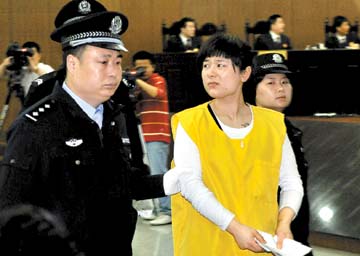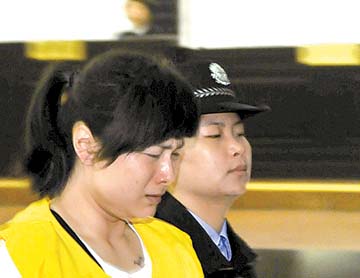The Research Bureau of the Central Bank conducted two reports on private lending, in 2008 and 2010. The reports found that the value of private lending in China may have exceeded 240 million yuan, 5.6 percent of the lending market. AS a former tycoon once listed as China’s sixth-richest woman shuffles down China’s death row, her case is giving new life to public appeal for reform of financial systems and application of the death penalty, a commentary released by Xinhua News Agency said Monday. On Jan. 19, the High People’s Court of Zhejiang Province upheld a capital sentence for 31-year-old Wu Ying after hearing the prosecution’s case that Wu, the boss of Bense Holding Group, bilked investors out of 380 million yuan (US$60.3 million) in an apparent Ponzi-like scheme that lasted nearly two years. The sentence is still subject to review by the Supreme People’s Court. Wu, who grew up in poverty, was found guilty of “fraudulent fundraising” after she collected as much as 770 million yuan with promises of 80 percent annual interest-rate returns. Prosecutors said she told her investors she would use the money to start companies, extend loans and improve existing businesses but, instead, used it to roll over debt and fund personal purchases of real estate and cars. Wu’s lawyers say she used the funds to invest in trading companies, hotels and property development, and that her investors were friends and not the general public. At a press conference yesterday, Shen Xiaoming, a judge from Zhejiang Higher People’s Court who rejected Wu’s appeal Jan. 18, denied a rumor that the court had made the verdict after receiving a letter signed by many local officials who had money links with Wu, who demanded in the letter Wu be given the death penalty.  He said many of Wu’s companies were not operational or running in red, adding that she concealed the truth and forged a highly profitable image of her businesses in order to get more money from investors. Shen said Wu incurred grave losses for the public and the country as a whole and deserves death in accordance with the country’s laws, which reserve execution for severe economic crimes such as fraud and corruption. The sentence has prompted widespread pleas for mercy from mainland citizens and discussions about the urgency of financial reform. Wu Ying’s case emphasizes a dilemma that small and medium-sized enterprises in China face, with the narrowing of funding channels and a system still under development. It is a well-known fact that, due to policy restraints, it is very difficult for private mainland entrepreneurs to obtain loans from banks. The line between private borrowing and illegal fundraising has become dangerously blurred. When Wu Ying found no support from official financial institutions, she turned to private lending, a gray area that falls outside the supervision of authorities. The final verdict in her case will directly affect private enterprises and private lending, and set a key precedent for future disputes, the commentary said. The Research Bureau of the Central Bank conducted two reports on private lending, in 2008 and 2010. The reports found that the value of private lending in China may have exceeded 240 million yuan, 5.6 percent of the lending market. In Zhejiang, Shanxi, Inner Mongolia and other provinces with active private lending, supervision by authorities can’t keep up with the speed of capital flow and innovative ways of pursuing profit. The reports found a 28-percent increase in private lending in China between 2008 and 2010. Inflation rates that outpace interest rates offered by official banks, and the liquidity of the past two years, have made the demand for private lending even larger. Last year, a government survey found that more than half of the 2,835 investigated companies in Zhejiang, flush with abundant private capital estimated at more than 1 trillion yuan, have sought financial help from private creditors. About 9 percent of the companies said they use high-interest private loans “all the time.” The most important question for businesspersons is not whether Wu is given the death sentence, but whether the debtor and creditor in a private lending arrangement have committed a crime by doing business outside the financing and credit system of the authorities. “In terms of the law, this case is rather clear. In terms of social influence, why is it so important to kill her, a young woman who has encountered problems in her business? What social effect would it bring if she were sentenced to death or sentenced heavily?” asked Tian Wenchang, director of King & Capital Law Firm, which is defending Wu. Is it more important to make Wu a sacrifice on the altar of control over private lending, or to lift the ban on private lending that’s already a common practice? The best result would be for Wu’s case to draw the attention of decision-makers, make them more aware of the current underground financing conditions and regulate the market. Private lending has a long history in China. Many creditors are very proud that they have far fewer bad debts than the banks. Private lending is common between family members, friends and close associates. Contrary to what some would say, the credibility is based on bonds of blood, friendship and geographical connection rather than the methods of the mafia world. People lend money to others because they “know where the debtor is rooted” and they believe “nobody will burn the bridges when they have to cross the river every day.” For about five years, though, private lending seems to have developed beyond “circles of family and friends.” Some underground banks are controlling tens of billions of yuan in cash.  There is currently no law or regulation naming a supervising institution of private lending in China. State financing supervision departments are said to be considering regulations on private lending that would be put on trial in Zhejiang. The primary goals are to clarify what constitutes illegal financing and fraud in fundraising, and to have every loan registered for future reference. Meanwhile, the severity of Wu’s punishment has sharpened public outcry over applications of the death penalty. Zhang Yanfeng, Wu’s defense lawyer, said he and his colleagues were shocked by the verdict and will plea for a lesser sentence ahead of a case review by the Supreme People’s Court. Many netizens called for a more lenient sentence for Wu. One fundamental question seems most disturbing to the public: Why must someone die for committing an economic crime that did not physically harm anybody? Public sympathy for Wu seems to partly stem from her compelling life story. She comes from Zhejiang Province, a bastion of small and medium-sized businesses known for entrepreneurship and for a robust underground lending market. A farmer’s daughter, she started with a single manicure salon in 1997 and went on to build a conglomerate with interests in hotels and construction. Niu Taisheng, vice chairman of Zhejiang’s law association, said it is becoming a consensus that those who commit nonviolent crimes should be exempt from receiving the death penalty in China. The authorities have said their ultimate goal is to abolish capital punishment — but the process should be gradual. China’s top legislature will review the Criminal Procedure Law in March.(Vivian Li) | 
